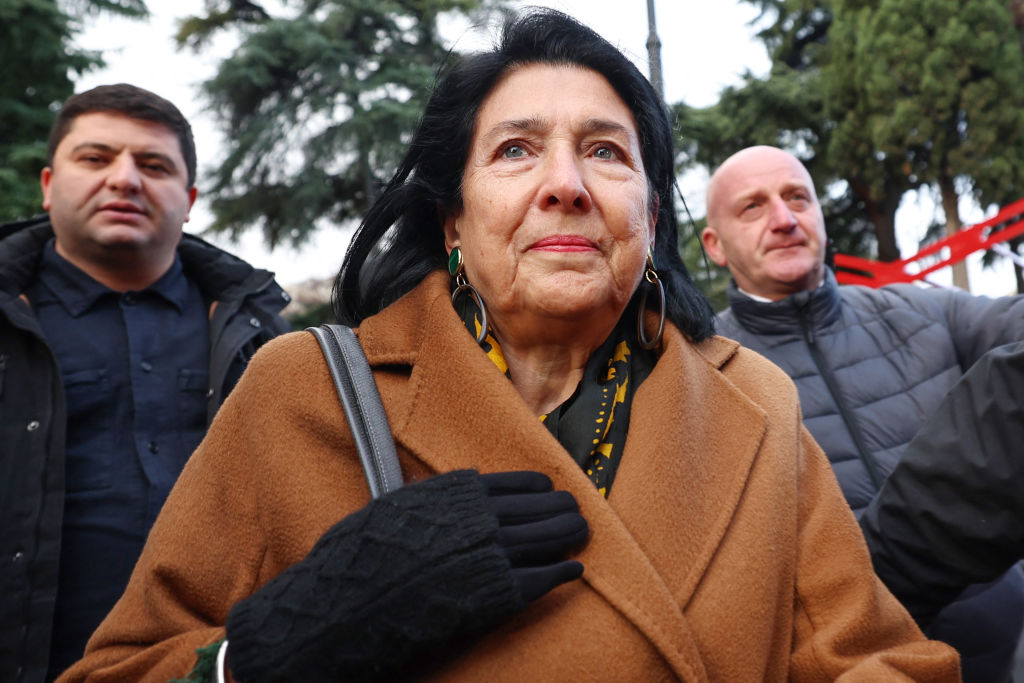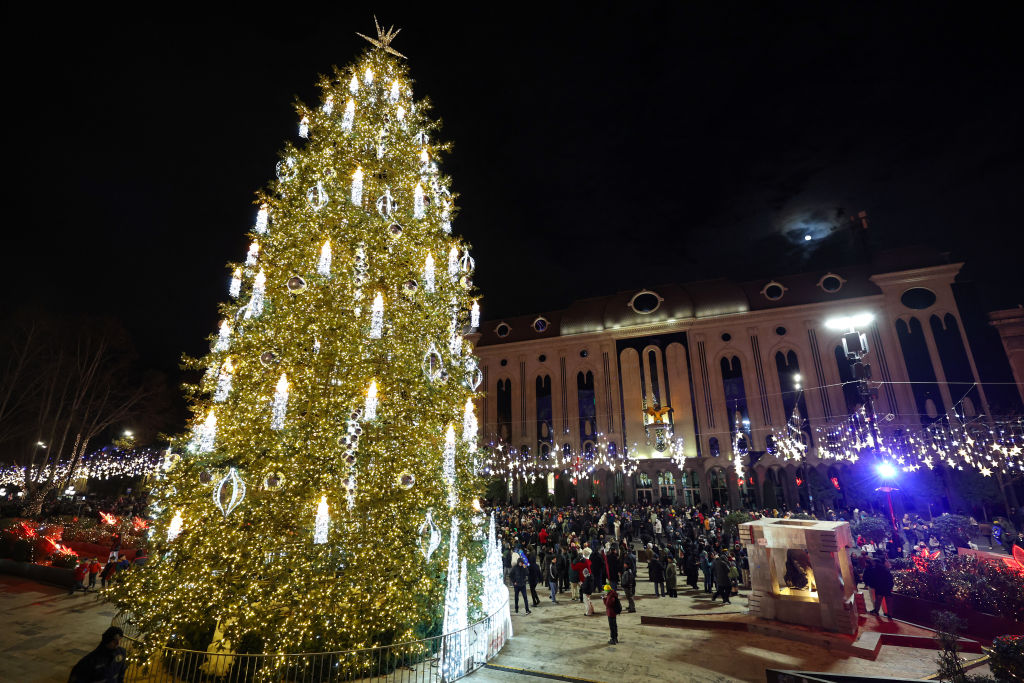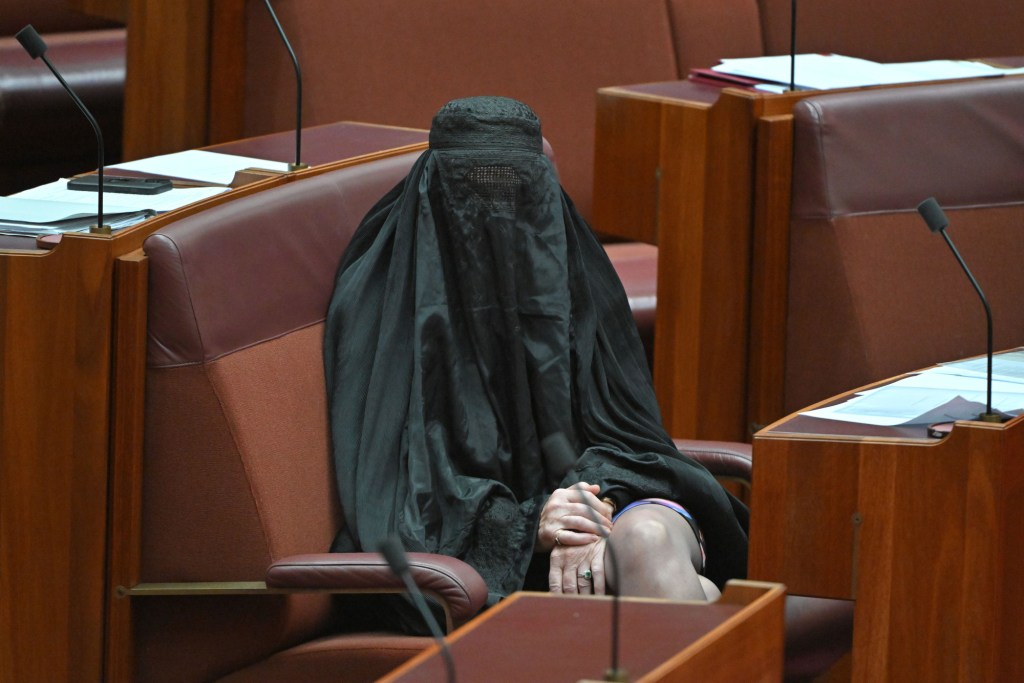‘They say the human body, given time, builds a resistance to pain. But after being tear-gassed six times in 21 nights, I can’t say I’ve started to tolerate it, let alone appreciate it,’ says a colleague who hasn’t missed a single night of the pro-European protests on Tbilisi’s Rustaveli Avenue since 28 November. She counts herself lucky; so far, she has avoided the brutal beatings meted out by the masked riot police, nicknamed ‘robocops’. These enforcers have become the Georgian government’s ruthless arm for crushing dissent, their mission seemingly to maim and mangle those who find the prospect of embracing the Kremlin’s Russkiy mir less than appealing and aren’t afraid to say so.
The protests, initially ignited by anger over alleged electoral fraud, swelled to unprecedented numbers a month ago today. On 28 November, Prime Minister Irakli Kobakhidze declared that Georgia would freeze EU accession talks until 2028, and rejected all EU budgetary support. Citing ‘blackmail’ and ‘insults’ from Brussels, he insisted that George would only join the EU on its own terms. For many, Kobakhidze’s rhetoric bore an uncanny resemblance to comments made by Ukraine’s then-president Viktor Yanukovych in 2013; his decision to freeze EU trade talks triggered the Maidan protests, paving the way for Putin’s annexation of Crimea, and the full-scale war with Russia.
What drove Kobakhidze to make his declaration – especially when the EU had already frozen the very same talks as punishment for Georgian Dream’s controversial ‘foreign agents’ law – remains an open question. Could a statement of that magnitude have been made without the blessing of billionaire Bidzina Ivanishvili, the party’s founder and its mastermind? If it was indeed Ivanishvili’s decision, it marks a rare misstep for the usually calculating oligarch – as both the timing and the fallout are proving to be disastrous for a regime that was already flailing in its attempts to secure international legitimacy after the disputed elections. If not, then we might have entered a brave new world, where Kobakhidze, famous [and prized] for his loyalty and unquestioning obedience to his patron, might have committed the cardinal sin of acting on his own free will.
Whatever it was, it reignited the protests to a scale unseen before. And with unprecedented numbers of protesters came an equally unprecedented level of police brutality. That no lives have been lost so far more lucky than intentional.
The government’s justification for the violent response? Some protesters allegedly launched fireworks at riot police. Their idea of an ‘adequate’ countermeasure? Tear gas, water cannons, rubber bullets, brutal beatings, and mass detentions under charges ranging from public disorder to plotting a coup d’état. Among those detained are minors, women, journalists, cultural figures and NGO workers. They recount tales of brutal beatings and psychological torment during their time in custody.
Wearing a press badge, once considered a safeguard, now appears to invite greater aggression. Journalist Guram Rogava describes his ordeal: ‘It felt like something out of a video game, as if I had a second life. Surviving was pure luck.’
He was struck in the head from behind and left sprawled in agony on the wet asphalt, repeatedly kicked:
Something exploded, and I raised my hands to protect my eyes. I was holding a microphone, doing my job. They knew I was a journalist. Their faces were masked, and they wore no identification. I know they’ll never tell us who they were. No investigation will bring them to justice – they had a green light to do what they did to me.
Another journalist, Aka Zarkua, endured almost ritualistic humiliation: ‘They beat me until they got bored. At one point, their commander tried to shove my press badge into my mouth.’
As brute force alone fails to quell the protests, the government has turned to legal repression. A new law, reminiscent of measures imposed by Ukraine’s Yanukovych regime during the Maidan protests, will soon ban protesters from covering their faces – effectively stripping them of basic protection against tear gas and exposing them to post-protest crackdowns. The legislation’s implications are clear: without the anonymity of a mask, dissenters risk an knock at their door and accusations of inciting civil unrest.
The Georgian Dream party remains adamant that they won’t allow the West to stage another ‘Maidan’ in Georgia. In yet another bizarre attack on the West, Mamuka Mdinaradze, a leading figure within the parliamentary majority, claimed that the West, in alliance with the Georgian opposition, planned a revolution for December 16-20 – only for the ever-watchful Georgian Dream to foil their plans.

With outgoing President Salome Zourabichvili becoming a champion for the protesters’ cause both at home and abroad, selecting her successor has become one of the most challenging tasks Georgian Dream has faced since its disputed victory in the November elections. The party has been twice bitten: Zourabichvili herself and her predecessor, philosopher Giorgi Margvelashvili, were hand-picked by the Georgian Dream only to turn into some of its fiercest critics.
Enter Mikheil Kavelashvili, a divisive figure from a radical offshoot of Georgian Dream. Known for his vehemently anti-western rhetoric, Kavelashvili is a former footballer whose resume includes stints in Russia, Switzerland, and a forgettable spell at Manchester City, long before the club’s glory days. (Highlights of his playing career in a sky-blue shirt? A solitary Premier League goal against arch-rivals United.)
His nomadic sporting career saw him pledge allegiance to three Swiss clubs that were bitter rivals of each other, but Kavelashvili the politician doesn’t seem to be prone to a change of heart. The sole qualification that appears to have landed him this nomination is loyalty.
‘They could’ve picked a labrador retriever and still run a higher risk of it going rogue than Kavelashvili,’ says one political analyst.
And yet the choice has sparked bemusement and consternation, even within the Georgian Dream’s own ranks. Many see it as a brazen demonstration of the presidency’s complete erosion as an institution. Among GD’s support base, aside from its most die-hard fans, the selection has been met with lukewarm approval at best.
Worse still, even though the Georgian Dream-controlled parliament has already declared Kavelashvili president-elect, President Zourabichvili has refused to vacate the presidential palace, citing the elections as illegitimate and insisting, therefore, that Kavelashvili has no legitimacy either. The showdown between the two looms large as Kavelashvili’s inauguration date of 29 December approaches.
Will the Georgian Dream resort to force? Kavelashvili himself has a penchant for fighting – having engaged in brawls during parliamentary sessions. Could Zourabichvili be arrested? While this seems unlikely, it is not out of the question.
For now, the Georgian Dream has relied on pettier measures – such as switching off the heating in the presidential palace – a move that appears to have done little to daunt its current resident. The inauguration may mark the official start of Kavelashvili’s presidency, but it remains to be seen whether he will have to find another, vacant palace to sit and play president in.

The European Union, meanwhile, is concerned. They’ve frozen Georgia’s EU accession talks, demanding a return to the democratic path, and issued condemnations against the Georgian Dream government in high halls like the European Parliament. But beyond this well-meaning finger-wagging, tangible actions have been few and far between.
The EU’s attempts to introduce sanctions have been blocked by Budapest and Bratislava – Kremlin’s trusted Trojan horses within the Brussels walls. The suspension of Georgia’s visa-free regime, while not requiring unanimous consent, is seen as a nuclear option – one that risks punishing ordinary Georgians more than their government.
In the absence of a united front, it has fallen on the individual countries to mete out the punishment. The Baltic trio has already imposed sanctions on Georgian Dream operatives, with Poland and the Scandinavian states poised to follow. What truly matters, however, is whether major players like Berlin, Paris, Rome, and London will join. Being shunned by Europe’s great capitals carries a toll far heavier than symbolic slaps on the wrist.
France seems most likely to take the lead. President Emmanuel Macron, who is close to Zourabichvili (she is French-born) has been increasingly vocal in his criticisms of the Georgian government’s actions.
And the US? Biden administration has suspended its ‘strategic partnership’ with Georgia, but this elicited little more than a shrug from Georgian Dream’s leadership. The PM boasted that they’d ‘sort it out’ with Trump and that whatever happens will be ‘as Trump says.’ (Much to Kobakhidze’s chagrin, it was not he, but Zourabichvili who recently met with Donald Trump during his visit to France. And it’s safe to say she wouldn’t have spent the precious minutes with the Potus-elect advocating for a regime she openly deems illegitimate.)
Yesterday, the US also imposed sanctions on Bidzina Ivanishvili himself. The official reasoning effective brands him a Russian stooge. Ivanishvili, it states, has been sanctioned ‘pursuant to section 1(a)(ii)(C) of Executive Order 14024 for being responsible for or complicit in, or having directly or indirectly engaged or attempted to engage in, actions or policies that undermine democratic processes or institutions in the United States or abroad, for or on behalf of, or for the benefit of, directly or indirectly, the Government of the Russian Federation’.
Still, the West appears reluctant to take decisive action. Georgia’s fight for European values, fought on the fringes of the continent, hasn’t spurred the kind of western resolve it deserves. The responses are closer to the Yes Minister approach to foreign crises: 1) nothing’s going to happen; 2) something may be going to happen, but we should do nothing about it; 3) maybe we should do something about it, but there’s nothing we can do; 4) maybe there was something we could’ve done, but it’s too late now.
Two starkly different futures seem possible for Georgia: one modelled after Belarus, the other after Ukraine. In Belarus, Alexander Lukashenko crushed dissent, tightened his grip on power, and, with Moscow’s backing, remains firmly in control. Ukraine’s Maidan revolution, on the other hand, triumphed but came at a devastating cost – a Kremlin bent on punishing its defiance unleashed years of war and suffering.
A seasoned observer of Georgia’s Byzantine political scene suggests other paths may emerge. One is a fragile compromise – a temporary truce between the opposing sides, holding out just long enough for hostilities to inevitably reignite. Another, even bleaker vision, sees Georgia morphing into an oil-less version of Azerbaijan. In this scenario, an agreement with Washington is brokered, with the ever-shrewd oligarch cutting a deal with the man who authored a book on the art of it.







Comments